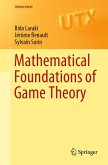This book develops the theory of monotone games in a new and unified manner and presents many applications. Incentives and outcomes studied in monotone games occur in a variety of disciplines, including biology, business, computer science, economics, mathematics, medicine, philosophy, political science, and psychology, among others. The book identifies unifying threads across different cases, showing how newer results are similar to or different from previous results, and how readers may better understand them under the umbrella of monotone games.
Dieser Download kann aus rechtlichen Gründen nur mit Rechnungsadresse in A, B, BG, CY, CZ, D, DK, EW, E, FIN, F, GR, HR, H, IRL, I, LT, L, LR, M, NL, PL, P, R, S, SLO, SK ausgeliefert werden.









